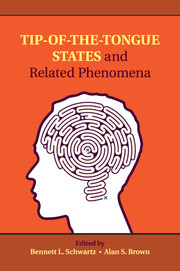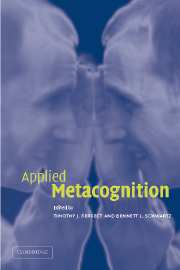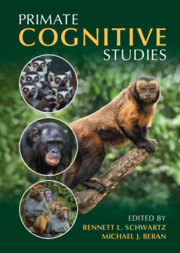Tip-of-the-Tongue States and Related Phenomena
When the memory retrieval process breaks down, people wonder exactly why and how such a thing occurs. In many cases, failed retrieval is accompanied by a “tip-of-the-tongue state,” a feeling that an unretrieved item is stored in memory. Tip-of-the-tongue states stand at the crossroads of several research traditions within cognitive science. Some research focuses on the nature of the retrieval failure. Other research tries to determine what tip-of-the-tongue states can tell us about the organization of lexical memory – that is, what aspects of a word we can recall when we are otherwise unable to do so. Still other research focuses on the nature of the experience of a tip-of-the-tongue state. Each of these perspectives is represented in this book, which presents the best theoretical and empirical work on these subjects. Much of the work is cross-disciplinary, but what unifies the topics in this book is that they concern strong phenomenological states of knowing that are not accompanied by recall or recognition of the desired information.
- The first edited book on tip-of-the-tongue phenomena
- Features contributions from the top researchers in this area from across the world
- Incorporates a mix of cognitive psychology and neuroscience, memory science and psycholinguistics
Product details
June 2014Hardback
9781107035225
363 pages
235 × 158 × 24 mm
0.63kg
43 b/w illus. 12 tables
Available
Table of Contents
- 1. Why tip-of-the-tongue states are important Alan S. Brown and Bennett L. Schwartz
- 2. Tip-of-the-tongue (TOT) states: mechanisms and metacognitive control Bennett L. Schwartz and Janet Metcalfe
- 3. There it is again on my tongue: tracking repeat TOTs Alan S. Brown and Katie Croft Caderao
- 4. Retrieval failures for the names of familiar people J. Richard Hanley
- 5. The effect of tip-of-the-tongue states on other cognitive judgments Anne M. Cleary, Shelly R. Staley and Kimberly R. Klein
- 6. Why the journey to a word takes you no closer Trevor A. Harley
- 7. Tip-of-the-tongue in mild cognitive impairment (MCI) Onésimo Juncos-Rabadán, David Facal and Arturo X. Pereiro
- 8. Metamemory and Parkinson's disease Justin D. Oh-Lee and Hajime Otani
- 9. Psychopharmacological approach of the metamemory and TOT phenomenon Marie Izaute and Elisabeth Bacon
- 10. Neurofunctional correlates of the tip-of-the-tongue state Fernando Díaz, Mónica Lindĺn, Santiago Galdo-Alvarez and Ana Buján
- 11. The blank in the mind experience: another manifestation of tip-of-the-tongue state or something else? Anastasia Efklides
- 12. On the empirical study of déjà vu: borrowing methodology from the study of the tip-of-the-tongue phenomenon Anne M. Cleary
- 13. Déjà vu in older adults Chris J. A. Moulin, Celine Souchay, Sarah Buchanan, Rosemary Bradley, Dilay Zeynep Karadoller and Melisa Akan
- 14. Odor knowledge, odor naming, and the 'tip-of-the-nose' experience Frederik U. Jönsson and Richard J. Stevenson
- 15. What do we know when we forget? Asher Koriat and Ravit Nussinson.






